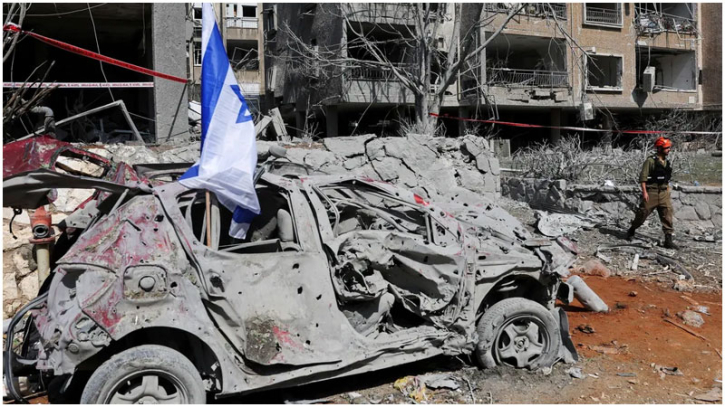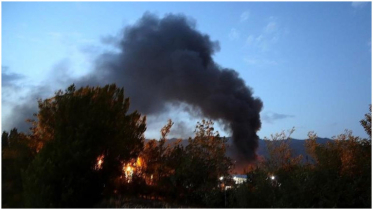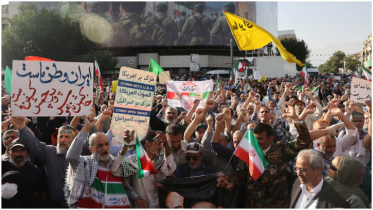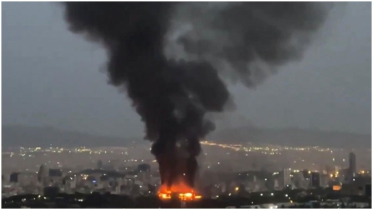Iran warns of ‘more devastating' response to Israel's attacks

Iranian President Masoud Pezeshkian warned Saturday that Iran would deliver a “more devastating” response if Israel’s sustained bombing campaign continues. Speaking amid a worsening conflict, Pezeshkian also vowed that Iran would not halt its nuclear programme “under any circumstances.”
The warning follows Israel’s announcement that it had eliminated three senior Iranian military commanders as part of its nine-day aerial offensive. Israeli Foreign Minister Gideon Saar claimed that the strikes had set back Tehran’s suspected nuclear weapons program by two years.
“We will do everything necessary to eliminate this threat,” Saar told Germany’s Bild newspaper, reaffirming Israel’s commitment to its campaign.
Since Israel launched its aerial assault on June 13, citing intelligence that Iran was nearing nuclear weapons capability, the two nations have exchanged intense attacks. On Saturday, Israel said it struck Iran’s Isfahan nuclear facility for the second time, damaging a centrifuge production site. The UN nuclear watchdog later confirmed the hit.
Further Israeli strikes reportedly targeted military facilities in Shiraz. In retaliation, Iran’s Revolutionary Guard said it had launched a massive wave of “suicide drones” aimed at strategic targets across Israel early Sunday.
While denying any pursuit of nuclear weapons, Iran reiterated its right to maintain a civilian nuclear programme. “This right cannot be taken away by threats or war,” said Pezeshkian. He also declared that any further Israeli aggression would be met with harsher retaliation.
During a phone call with French President Emmanuel Macron, Pezeshkian expressed Iran’s willingness to engage in diplomatic talks to build confidence in the peaceful nature of its nuclear activities. However, he firmly ruled out eliminating nuclear activities entirely, stating: “We will not agree to reduce them to zero under any circumstances.”
Iran’s armed forces also issued a warning that any country providing military aid to Israel could become a target. The United States, Israel’s primary arms supplier, has hinted at deeper involvement. Former President Donald Trump, speaking Friday, gave Tehran a two-week deadline to avoid potential American airstrikes.
Meanwhile, Iranian Foreign Minister Abbas Araghchi met counterparts from the Organisation of Islamic Cooperation in Istanbul. In Geneva, diplomats from the UK, France, and Germany urged Iran to return to nuclear negotiations with the U.S. Araghchi, however, rejected talks under current conditions: “Diplomacy will be reconsidered only when the aggression stops, and the aggressors are held accountable.”
Trump appeared dismissive of diplomatic efforts, saying, “If someone’s winning, it’s harder to ask them to stop,” in reference to Israel’s offensive.
Speculation is rising over potential U.S. military involvement. Media reports indicate B-2 stealth bombers—capable of carrying bunker-buster bombs designed to destroy Iran’s fortified Fordo nuclear site—are en route across the Pacific.
The broader regional implications are growing. Yemen’s Iran-backed Huthi movement warned it would resume attacks on U.S. ships in the Red Sea if Washington enters the war, despite a recent ceasefire.
Human rights groups have reported mounting casualties. According to the U.S.-based Human Rights Activists News Agency, at least 657 people have been killed in Iran, including 263 civilians. Iran’s health ministry reported over 400 deaths and more than 3,000 injuries from Israeli strikes. In Israel, Iranian retaliatory strikes have killed at least 25 people.
On Saturday, Israel said it had launched new airstrikes on targets near the southern Iranian port of Bandar Abbas, hitting drone storage and weapons facilities. Iranian air defences were reportedly activated in the area.
Iran later confirmed it had launched drones and missiles at central Israel, with one drone hitting a residential building. Israeli authorities said no casualties were reported. Iran’s Revolutionary Guard claimed it had struck 14 “strategic military” targets, including Haifa’s Sail Tower, the city’s oil refinery, and the Ovda airbase.
Israeli authorities also reported foiling an Iranian terror plot targeting Israelis in Cyprus.
With over 450 missiles and 400 drones fired at Israel so far, fatigue is growing among Tel Aviv’s residents. Meanwhile, Tehran remains largely calm, though symbolic demonstrations in support of the government and its allies were held Saturday.
The conflict has reignited global concern over Iran’s expanding nuclear program. Rafael Grossi, head of the International Atomic Energy Agency, noted that Iran is the only non-nuclear-armed country enriching uranium up to 60 percent purity. Still, the IAEA has found “no indication” of a coordinated nuclear weapons programme.
Grossi told CNN that it would be “pure speculation” to predict how long it might take Iran to build a bomb if it chose to pursue one.
.png)




